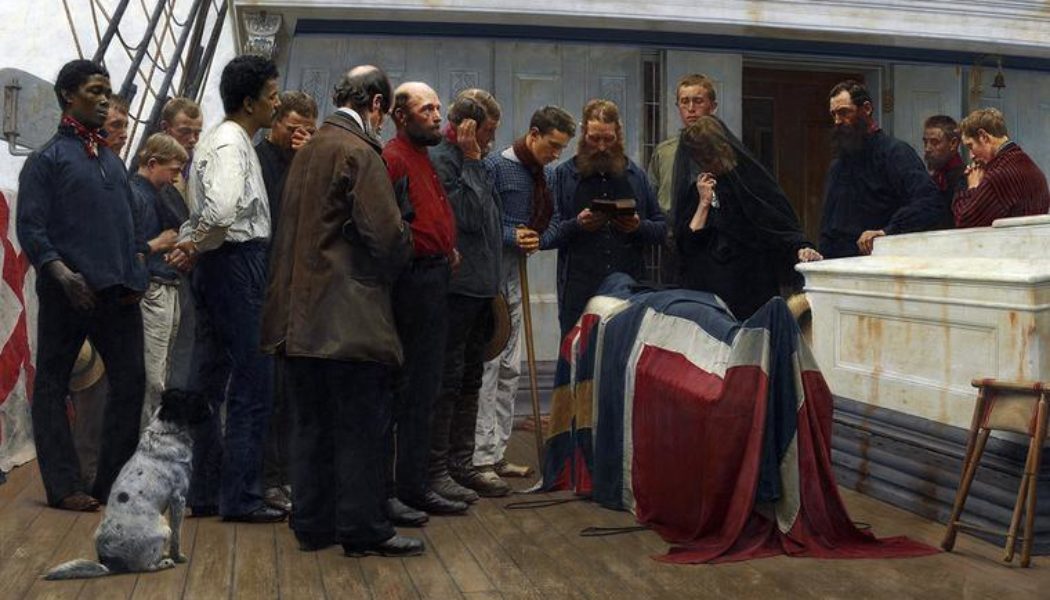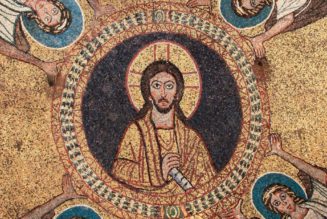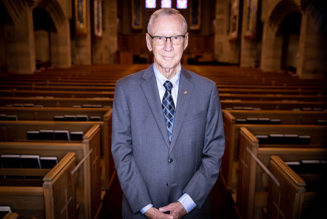
Preaching at a funeral Mass must be a real challenge for priests. American culture always wants you to say “nice things” that don’t “disturb” others. Pace St. Paul (1 Corinthians 13:13), one suspects that for most bishops the greatest virtue is peace and quiet.
American culture also thinks of the funeral homily as a eulogy, a “celebration” of the decedent’s life and a paean to his accomplishments, none of which is the purpose of a homily. Finally, funerals are also one of those rare opportunities where priests have the unchurched and the lapsed in church. Unlike the regular occurrence of the “feast of the fallen away” (Christmas Mass), funerals and weddings may actually bring in more such persons: it’s easier to blow off Christmas than your relative’s burial (although I suspect that “memorial services” now scheduled for the convenience of the living rather than the needs of the dead may also lend themselves to being skipped out of “inconvenience”).
One would think that a funeral is a kairos, an opportune moment to speak the evangelical message of conversion. Mortality, after all, has had a long and salutary track record of singularly focusing human attention on what is essential. In that sense, I can agree with the contemporary claim that “funerals are more about the living than the dead.” While the dead may need our prayers, those in via still have the opportunity to do something for ourselves. We need only to remind them of that truth.
While there should be no issue about acknowledging what the deceased has done or, even more importantly, been (not in terms of resumes but of the important things, like mother, father, husband or wife), to keep the funeral homily from degenerating into a personal eulogy I suggest its operative theme be “a eulogy for everyman.”
“Everyman,” you might remember, was an English medieval mystery play, part of a broader such genre within Christendom at large. “Everyman” focuses on a person on the verge of death who is looking to be accompanied on that journey. All of Everyman’s fair-weather friends bid him adieu: friendship, relatives, money and goods all leave him.
Only “Good Works” is even interested in accompanying Everyman as he is wheeled feet first out of the field hospital of life. But while “Good Works” are willing, they are unable: absent sanctifying grace, they lie paralyzed, unable to move. Only until Everyman first visits Confession and is restored to grace do Good Works proclaim:
I am now able to walk and go;
And am delivered of my sickness and woe.
Therefore with Everyman I will go and not spare;
His good works I will help him to declare.
A “Eulogy for Everyman” should, while consoling the bereaved, remind them of the perennial truth modernity neither asks nor tells: There is a day like this waiting for everyone, for each and every one, today in this church. Grief over our beloved should not make us forget that, after man’s fall, funerals became part of all our futures. Pace Franklin, we might escape the tax reaper (who likely is one of the few who still exacts from the sons for the debts of the father) but not from the Grim Reaper.
Refocusing peoples’ attention to that shared experience — past in terms of memories of those who “have gone before us,” present in terms of today’s funeral, and future in terms of our own inevitable reckoning — today’s Everyman is welcome to remember his mortality. “It is appointed for man once to die, and after death the judgment” (Hebrews 9:27).
Reading the “signs of the times” means asking, “what do you really believe about death? Do you really believe there is something more? Do you really believe what we are saying and doing here today? Or do you really think it’s just a comforting ritual and no more, that X and you and I are gone and finished and … that’s all there is?”
If we’re not ready to talk about death and what we think about it at a funeral, when will we think about it?
“Out of sight, out of mind.” Tomorrow, the world will return to normal for most of these mourners, save those closest to the deceased. Absent any social period of public mourning in our culture, as Damien Le Guay notes, those closest to the deceased will confine their grief to private spaces and times while presenting a public front that encourages us to acknowledge their “strength” — if we say anything about it at all to them.
In this scenario, the meaning of death and its shared communal understanding within the Church is really neither acknowledged nor “celebrated.” It just gets kicked down the road. The truth is that we bowl, die and believe what we do about death alone.
Everyman brings us back to a shared meaning of an ineluctable common experience. Let me add one more note about good works.
The playwright of “Everyman” personified “Good Works,” but I’m convinced it was not just a dramatic tool. He was on to something. As Karol Wojtyła noted, following many other philosophers, actions do not just accomplish things out in the external world but, more importantly, they make me into a particular person. My acts are self-reflexive: they define me.
That is why conscience rights are so sacred: no one has a right to force me through what I do to become a certain kind of person. No one has the right to hijack my actions to make me do evil because no one has the right to try and make me bad.
Our deeds “accompany” us through death, as Everyman suggests, because they are part of us. But our mortality, including our good works, must be enlivened by God’s grace. They are not self-sufficient. There are no “good works” without charity, and there is no charity — a supernatural virtue — without grace.
There is not some “reservoir” of good deeds that coexists with mortal sin. Without grace, our good deeds are dead, lacking merit for salvation. They are ineffective, paralyzed. Given our culture’s downplaying of sin, we are prone to forget that. So, being “right” with God has an existential significance for whom we are.
Priests can resist the pressure to “eulogize” if they are willing to preach a “eulogy for Everyman,” reminding people — including those perhaps most in need of it — about existential truths relevant to this watershed moment of life.
Adapting St. Josemaría Escrivá’s advice about preaching the truth of hell, one can say: “‘You will die.’ Not a very original statement, you think. I will repeat it: ‘You will die.’ Echo it for me, at the right moment, in the ear of one friend …”
Join Our Telegram Group : Salvation & Prosperity








